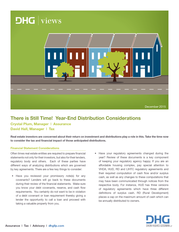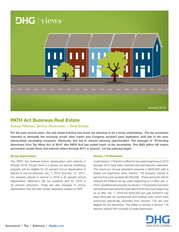The “Protecting Americans from Tax Hikes Act of 2015 - PATH Act Real Estate Individual – January 2016
Dixon Hughes Goodman
Description
views
Nonbusiness Energy Property Credit
For Virginia First-Time Homebuyers
Certain energy efficient improvements to existing homes will
now qualify for a 10 percent credit through 2016. The total
credit for all tax years can’t exceed $500, no more than $200
of which can be claimed for expenditures for windows. The
limits imposed are lifetime limits, therefore taxpayers who have
already used the maximum credit may not claim any additional
credit. Improvements that qualify include components that
meet or exceed criteria established by the 2009 International
Energy Conservation Code, that are installed in a U.S.
dwelling located in the U.S. and owned and used by the taxpayer as his/her primary residence, whose original use commences with the taxpayer, and that reasonably can be expected to remain in use for at least five years. This does not fall under the PATH Act but is a relatively new provision for the state. Under this program Virginia residents may designate an account with a financial institution as a firsttime homebuyer savings account.
Earnings on these accounts such as dividends, interest and capital gains may be excluded from Virginia income. Distributions from this account must be used for a down payment and/or approved closing costs. If distributions are used for any other purpose previously taken subtractions are subject to recapture (must be included in income). For Real Estate Investors/Professionals If you are a real estate investor there are several other provisions that have been extended or made permanent that may provide planning opportunities including, but not limited to: a five year extension of bonus depreciation, the permanent extension of the increased Section 179 deduction, the permanent extension of the 15-year depreciation recovery period for certain property, a relaxed definition of qualified leasehold improvement property, the extension of low income housing credit percentages, as well as two-year extensions of the energy efficient commercial building deduction and the credit for energy efficient homes. Residential Energy Efficient Property (REEP) Credit The REEP credit for solar property has been extended through 2021; however, the credit begins to phase out for property placed in service after 2019.
A 30 percent credit is currently available for property placed in service through 12/31/19. The credit reduces to 26 percent for property placed in service in 2020 and to 22 percent for property placed in service in 2021. The credit is available for qualified solar property and qualified solar water heating property. This is just the beginning; there are several other extensions, some permanent, of credits and deductions relating to both individuals and businesses. For more information or an analysis of how the PATH Act affects you, please contact your tax advisor. Assurance | Tax | Advisory | dhgllp.com 2 .
dwelling located in the U.S. and owned and used by the taxpayer as his/her primary residence, whose original use commences with the taxpayer, and that reasonably can be expected to remain in use for at least five years. This does not fall under the PATH Act but is a relatively new provision for the state. Under this program Virginia residents may designate an account with a financial institution as a firsttime homebuyer savings account.
Earnings on these accounts such as dividends, interest and capital gains may be excluded from Virginia income. Distributions from this account must be used for a down payment and/or approved closing costs. If distributions are used for any other purpose previously taken subtractions are subject to recapture (must be included in income). For Real Estate Investors/Professionals If you are a real estate investor there are several other provisions that have been extended or made permanent that may provide planning opportunities including, but not limited to: a five year extension of bonus depreciation, the permanent extension of the increased Section 179 deduction, the permanent extension of the 15-year depreciation recovery period for certain property, a relaxed definition of qualified leasehold improvement property, the extension of low income housing credit percentages, as well as two-year extensions of the energy efficient commercial building deduction and the credit for energy efficient homes. Residential Energy Efficient Property (REEP) Credit The REEP credit for solar property has been extended through 2021; however, the credit begins to phase out for property placed in service after 2019.
A 30 percent credit is currently available for property placed in service through 12/31/19. The credit reduces to 26 percent for property placed in service in 2020 and to 22 percent for property placed in service in 2021. The credit is available for qualified solar property and qualified solar water heating property. This is just the beginning; there are several other extensions, some permanent, of credits and deductions relating to both individuals and businesses. For more information or an analysis of how the PATH Act affects you, please contact your tax advisor. Assurance | Tax | Advisory | dhgllp.com 2 .
Personal Finance Presentations
+
Personal Finance Sub Categories
Dixon Hughes Goodman









